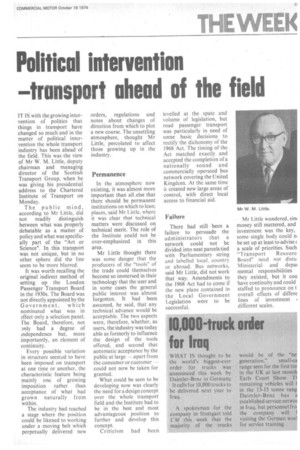Political intervention —transport ahead of the field
Page 17

If you've noticed an error in this article please click here to report it so we can fix it.
IT IS with the growing intervention of polities that things in transport have changed so much and in the matter of political intervention the whole transport industry has been ahead of the field. This was the view of Mr W. M. Little, deputy chairman and managing director of the Scottish Transport Group, when he was giving his presidential address to the Chartered Institute of Transport on Monday.
The public mind, according to Mr Little. did not readily distinguish between what was properly debatable as a matter of policy and what was specifically part of the "Art or Science". In this transport was not unique, but in no other sphere did the line seem to be more blurred.
It was worth recalling the original indirect method of setting up the London Passenger Transport Board in the 1930s. The Board was not directly appointed by the Government, which nominated what was in effect only a selection panel. The Board, therefore, not 3nly had a degree of independence but, more importantly, an element of continuity.
Every possible variation in structure seemed to have been imposed on transport at one time or another, the characteristic feature being mainly one of growing imposition rather than acceptance of what had grown naturally from within.
The industry had reached a stage where the position could be likened to working under a moving belt which perpetually delivered new orders, regulations and notes about changes of direction from which to plot a new course. The unsettling atmosphere, thought Mr Little, percolated to affect those growing up in the industry.
Permanence
In the atmosphere now existing, it was almost more important than all ,else that there should be permanent institutions on which to lean; places, said Mr Little, where it. was clear that technical matters were discussed on technical merit. The role of the Institute could not be over-emphasized in this area.
Mr Little thought there was some danger that the producers of the "tools" of the trade could themselves become so immersed in their technology that the user and in some cases the general public interest was almost forgotten. It had been assumed, he said, that any technical advance would be acceptable. The two aspects were, therefore, whether, as users, the industry was today able as formerly to influence the design of the tools offered, and second that automatic acceptance by the public at large apart from the consumer or customer could not now be taken for granted.
What could be seen to be developing now was clearly the need fora design concept over the whole transport field and the Institute had to be in the best and most advantageous position to further and develop this concept.
Criticism had been levelled at the spate and volume of legislation, but road passenger transport was particularly in need of some basic decisions to rectify the dichotomy of the 1968 Act. The timing of the Act matched exactly and accepted the completion of a nationally sound and commercially operated bus network covering the United Kingdom. At the same time it created new large areas of control, with direct local access to financial aid.
Failure
There had still been a failure to persuade the administrators that a network could not be divided into neat parcels tied with Parliamentary string and labelled local, country or abroad. Bus networks, said Mr Little, did not work that way. Amendments to the 1968 Act had to come if the new plans contained in the Local Government Legislation were to be successful. Mr Little wondered, sin( money still mattered, and investment was the key, some single body could ni be set up at least to advise a scale of priorities. Such "Transport Resourc, Board" need not distu Ministerial and depai mental responsibilities they existed, but it coo have continuity and could staffed to pronounce on t overall effects of differe lines of investment different scales.




































































































